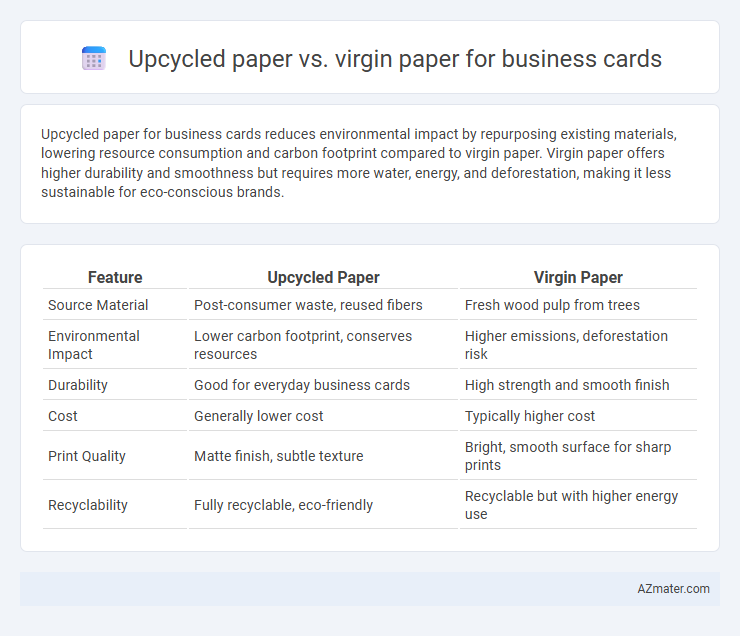Upcycled paper for business cards reduces environmental impact by repurposing existing materials, lowering resource consumption and carbon footprint compared to virgin paper. Virgin paper offers higher durability and smoothness but requires more water, energy, and deforestation, making it less sustainable for eco-conscious brands.
Table of Comparison
| Feature | Upcycled Paper | Virgin Paper |
|---|---|---|
| Source Material | Post-consumer waste, reused fibers | Fresh wood pulp from trees |
| Environmental Impact | Lower carbon footprint, conserves resources | Higher emissions, deforestation risk |
| Durability | Good for everyday business cards | High strength and smooth finish |
| Cost | Generally lower cost | Typically higher cost |
| Print Quality | Matte finish, subtle texture | Bright, smooth surface for sharp prints |
| Recyclability | Fully recyclable, eco-friendly | Recyclable but with higher energy use |
Introduction: The Debate on Business Card Materials
Upcycled paper uses recycled fibers, reducing environmental impact and promoting sustainability in business card production, while virgin paper relies on fresh pulp, offering higher durability and print quality but with increased resource consumption. Businesses face a critical choice balancing eco-friendliness and premium aesthetics in their card materials. Understanding the environmental footprint and brand messaging implications drives the debate on upcycled versus virgin paper for business cards.
What is Upcycled Paper?
Upcycled paper for business cards is made by repurposing waste materials like used paper, cardboard, and other discarded fibers, reducing the need for virgin pulp and minimizing environmental impact. Compared to virgin paper, which is produced directly from newly harvested trees, upcycled paper conserves natural resources and promotes sustainable business practices. This eco-friendly alternative offers a unique texture and story that appeals to environmentally conscious consumers while maintaining quality and durability.
Understanding Virgin Paper: Key Characteristics
Virgin paper for business cards is made from freshly harvested wood pulp, offering superior strength, brightness, and a smooth finish that enhances printing quality. It provides consistent texture and durability, ideal for premium business cards requiring a professional look. The absence of recycled fibers ensures vibrant colors and sharp details, making virgin paper a preferred choice for high-end branding materials.
Environmental Impact Comparison
Upcycled paper significantly reduces environmental impact for business cards by minimizing deforestation and lowering water and energy consumption compared to virgin paper production. Virgin paper manufacturing involves extensive use of raw timber, leading to habitat destruction and higher carbon emissions. Choosing upcycled paper supports sustainability efforts by promoting waste reduction and conserving natural resources.
Cost Analysis: Upcycled vs Virgin Paper
Upcycled paper for business cards typically offers a cost advantage over virgin paper, as it utilizes recycled materials that reduce raw material expenses and manufacturing energy consumption. Virgin paper incurs higher costs due to the use of fresh wood pulp and intensive processing, which increase both production time and environmental impact fees. Businesses prioritizing budget efficiency and sustainability often find upcycled paper to be a more economical choice without compromising print quality.
Print Quality and Aesthetics
Upcycled paper for business cards offers a unique, textured finish that enhances visual appeal while supporting sustainability, though it may have slight inconsistencies in color and smoothness compared to virgin paper. Virgin paper provides a consistently smooth surface and vibrant print quality, ensuring sharp graphics and text ideal for professional-grade business cards. Choosing between upcycled and virgin paper depends on balancing eco-conscious aesthetics with the desired precision and brilliance in print quality.
Brand Image and Sustainability
Upcycled paper enhances a business card's brand image by showcasing a commitment to environmental responsibility and sustainable practices, appealing to eco-conscious clients. Virgin paper typically offers higher print quality but may project a less environmentally friendly message, potentially affecting brand perception negatively. Using upcycled paper strengthens corporate social responsibility credentials while reducing the carbon footprint associated with paper production.
Durability and Functional Differences
Upcycled paper for business cards offers a sustainable option but typically has lower durability compared to virgin paper due to its recycled fiber content, which can weaken the card's structure. Virgin paper, made from fresh pulp, provides superior strength, water resistance, and print quality, ensuring a professional appearance and longer lifespan. Functionally, virgin paper handles embossing and foil stamping better, while upcycled paper may show more texture and organic imperfections, appealing to eco-conscious branding.
Availability and Customization Options
Upcycled paper for business cards often offers limited availability compared to virgin paper, which is widely accessible in various weights, finishes, and textures. Virgin paper provides extensive customization options, including vibrant color printing, embossing, and specialty coatings, allowing businesses to create highly personalized cards. Upcycled paper tends to have fewer customization choices due to its recycled content and manufacturing constraints, impacting design flexibility.
Choosing the Right Paper for Your Business Cards
Choosing the right paper for your business cards impacts both brand impression and environmental responsibility. Upcycled paper offers a sustainable, eco-friendly option with unique textures and a story of reuse, while virgin paper provides a smoother finish and uniformity crucial for high-detail designs. Prioritize your brand values and desired aesthetic to decide between the recycled appeal of upcycled paper and the polished look of virgin paper for effective business card presentation.

Infographic: Upcycled paper vs Virgin paper for Business card
 azmater.com
azmater.com